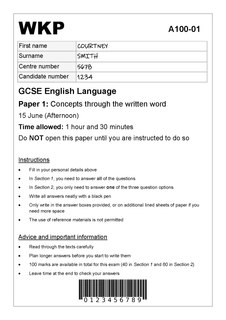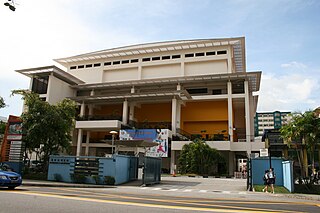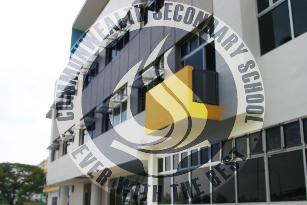
The General Certificate of Secondary Education (GCSE) is an academic qualification in a particular subject, taken in England, Wales, and Northern Ireland. State schools in Scotland use the Scottish Qualifications Certificate instead. Private schools in Scotland may choose to use an alternative qualification.
The General Certificate of Education (GCE) is a subject-specific family of academic qualifications used in awarding bodies in England, Wales, Northern Ireland, Crown dependencies and a few Commonwealth countries. For some time, the Scottish education system has been different from those in the other countries of the United Kingdom.
The Secondary School Certificate, also called SSC or Matriculation examination, is a public examination in Bangladesh, India and Pakistan conducted by educational boards for the successful completion of the secondary education exam in these countries. Students of 10th grade/class ten can appear in these. It is equivalent to GCSE in England and first two years of high schools in United States.
The Certificate of Secondary Education (CSE) was a subject-specific qualification family awarded in both academic and vocational fields in England, Wales and Northern Ireland. CSE examinations were held in the years 1965 to 1987. This qualification should not be confused with the Indian Certificate of Secondary Education which is the school leaving qualification in India. Also, in some African and former British colonial countries there is a qualification named the Certificate of Secondary Education based on the original and former British variant. Also, the CSE should not be confused with the African qualification CSEE.

Ngee Ann Secondary School (NASS) is a co-educational government-aided autonomous secondary school in Tampines, Singapore. Founded in 1994 by the Ngee Ann Kongsi, a Teochew clan foundation, Ngee Ann Secondary School is a successor to the now defunct Tuan Mong High School. The school offers secondary education leading to the Singapore-Cambridge GCE Ordinary Level or Singapore-Cambridge GCE Normal Level examination.
The Singapore-Cambridge General Certificate of Education Ordinary Level (O-Level) examination is a national examination held annually in Singapore. The examinations are jointly conducted by the University of Cambridge Local Examinations Syndicate (UCLES), Singapore Ministry of Education (MOE) as well as the Singapore Examinations and Assessment Board (SEAB).

Commonwealth Secondary School is a government, autonomous and coeducational secondary school in Jurong East, Singapore. Founded in 1964, Commonwealth Secondary School offers secondary school education which leads to the Singapore-Cambridge GCE Ordinary Level or Singapore-Cambridge GCE Normal Level examination.

The A Level is a subject-based qualification conferred as part of the General Certificate of Education, as well as a school leaving qualification offered by the educational bodies in the United Kingdom and the educational authorities of British Crown dependencies to students completing secondary or pre-university education. They were introduced in England and Wales in 1951 to replace the Higher School Certificate.

The O Level is a subject-based qualification conferred as part of the General Certificate of Education. It was introduced in place of the School Certificate in 1951 as part of an educational reform alongside the more in-depth and academically rigorous A-level in England, Wales and Northern Ireland. Those three jurisdictions replaced O Levels gradually with General Certificate of Secondary Education / GCSE and International General Certificate of Secondary Education (IGCSE) exams over time. The Scottish equivalent was the O-grade.

Geylang Methodist School (Secondary) is a co-educational government-aided Methodist secondary school located in Geylang, Singapore. Founded in 1924, the school offers secondary education leading to the Singapore-Cambridge GCE Ordinary Level or Singapore-Cambridge GCE Normal Level examinations. The incumbent principal is Mr Victor Owyong.
The General Certificate of Education (GCE) Advanced Level, or A Level, is a main school leaving qualification in England, Wales, Northern Ireland, the Channel Islands and the Isle of Man. It is available as an alternative qualification in other countries.
Junior colleges are pre-university institutions in Singapore that offer two-year pre-university courses that leads to either the Singapore-Cambridge GCE Advanced Level or the International Baccalaureate Diploma.
The Singapore-Cambridge General Certificate of Education Advanced Level is a GCE Advanced Level examination held annually in Singapore and is conducted jointly by the Singapore Ministry of Education (MOE), Singapore Examinations and Assessment Board (SEAB) and the University of Cambridge Local Examinations Syndicate (UCLES).

Bukit Merah Secondary School (BMSS) is a co-educational government secondary school in Bukit Merah, Singapore. BMSS has established itself as a Value-Added school since 1993, offering the Express, Normal Academic and Normal Technical streams leading to a Singapore-Cambridge GCE Ordinary Level or Singapore-Cambridge GCE Normal Level certificate.

Secondary education in Singapore is largely public, and is compulsory until a child has reached 16 years of age. At the end of public primary education, Singapore students take the Primary School Leaving Examination (PSLE) and are placed into the different streams and secondary schools based on their results. There are three main public secondary education streams: Express, Normal (Academic) , and Normal (Technical), with special and private education courses also being available. The Express stream has a higher cut-off mark than the Normal (Academic) stream, which has a higher cut-off than the Normal (Technical) stream. Secondary students can move between streams based on their academic performance.
A high school diploma or high school degree is a North American academic school leaving qualification awarded upon high school graduation. The high school diploma is typically obtained after a course of study lasting four years, from grade 9 to grade 12. The diploma is awarded by the school in accordance with the requirements of the local state or provincial government. Requirements for earning the diploma vary by jurisdiction, and there may be different requirements for different streams or levels of high school graduation. Typically they include a combination of selected coursework meeting specified criteria for a particular stream and acceptable passing grades earned on the state exit examination.

The General Certificate of Education (GCE) Ordinary Level, also called the O-level or O level, was a subject-based academic qualification. Introduced in 1951 as a replacement for the 16+ School Certificate (SC), the O-level would act as a pathway to the new, more in-depth and academically rigorous A-level, in England, Wales and Northern Ireland. Later the complementary and more vocational Certificate of Secondary Education (CSE) was added to broaden the subjects available and offer qualifications in non-academic subjects.
The Singapore-Cambridge General Certificate of Education Normal Level (N-Level) examination is a national examination held annually in Singapore. It is taken after four years in the normal academic or normal technical stream. For subjects examined in English and foreign languages, the examining authority are the University of Cambridge Local Examinations Syndicate. For localized language subjects, the examining authority is the Ministry of Education, Singapore.
In Nigeria, the academic grading system scales from A to F (fail). Below is the grading system of Nigerian schools.









